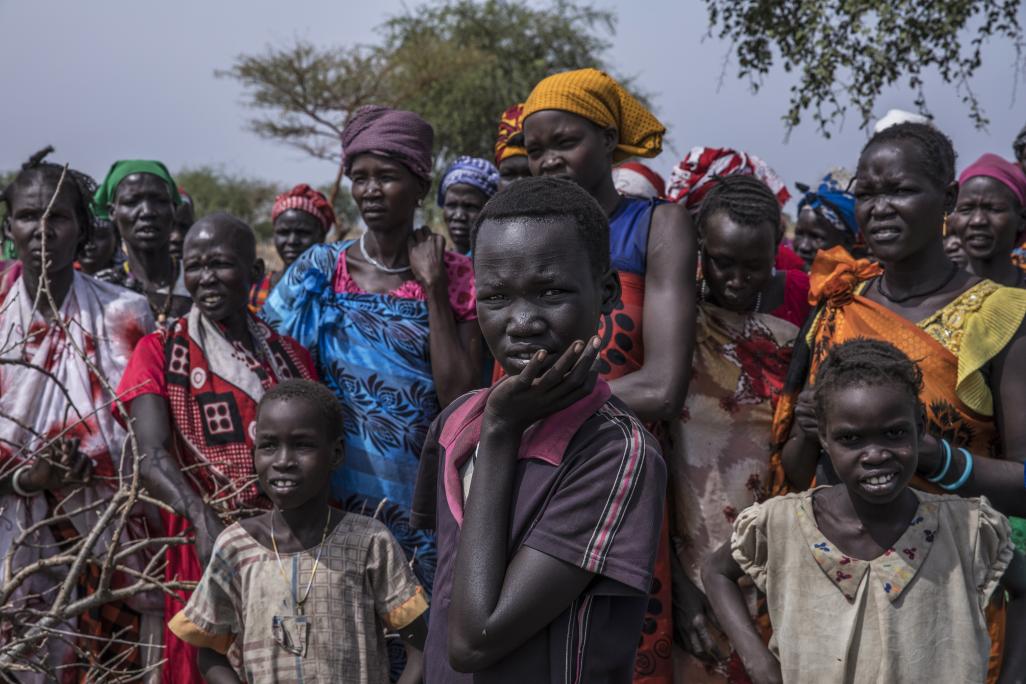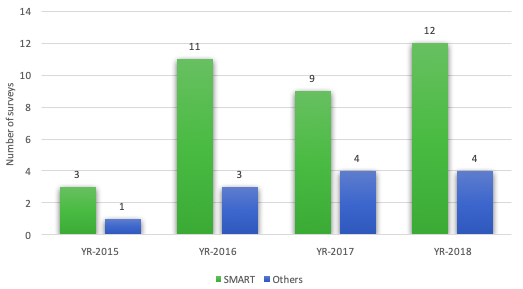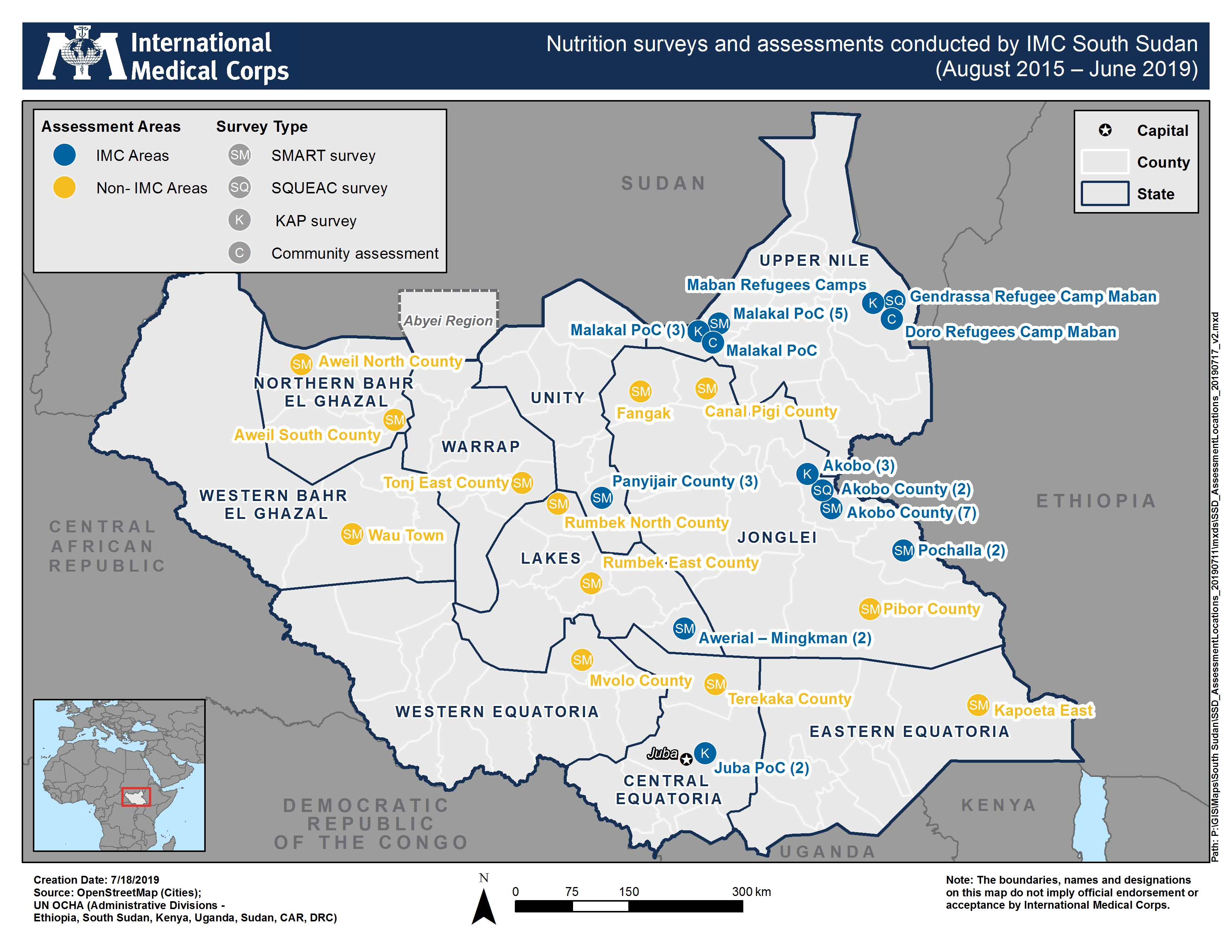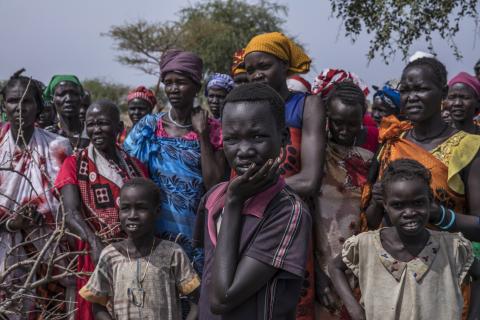International Medical Corps strengthens nutrition alert and surveillance systems in South Sudan
By Muhammad Ali Jatoi, Deepak Kumar, Dugsiye Ahmed and Iris Bollemeijer
Muhammad Ali Jatoi is the Senior Nutrition Surveillance Manager at International Medical Corps (IMC) South Sudan, where he manages surveillance and is responsible for the coordination and representation of IMC in the Nutrition Information Working Group (NIWG) and Nutrition Cluster with regard to assessments and surveys.
Deepak Kumar is a roving nutritionist for IMC South Sudan. He has extensive experience in conducting operational research, surveys and assessments.
Dugsiye Ahmed is a nutrition coordinator and head of the nutrition department in IMC South Sudan. He is responsible for the overall performance of all nutrition programming and provides technical support to the surveillance section.
Iris Bollemeijer is a nutrition advisor for IMC for north Africa, east Africa, Asia and Europe. She provides remote and in-country technical support for the design and implementation of IMC’s nutrition programmes.
The authors would like to acknowledge the following agencies who supported the programme described in this article: Ministry of Health South Sudan, NIWG South Sudan, the Nutrition Cluster South Sudan, the Office of U.S. Foreign Disaster Assistance (OFDA) and the United Nations Children’s Fund (UNICEF). In addition, the authors would like to thank Clara Long (Media and Communications Officer at IMC) for her support in writing the article and Samuel Mbuto for his dedication and efforts in establishing the surveillance system, as well as his support in writing this article.
Location: South Sudan
What we know: Nutrition surveillance is needed to provide timely, reliable data to monitor population nutrition status and inform programme interventions and decision-making.
What this article adds: In 2015 International Medical Corps (IMC) established a Nutrition Alert and Surveillance Strengthening (NASS) team to support the Food Security and Nutrition Monitoring System (FSNMS), the primary national information system, and Integrated Food Security Phase Classification (IPC). Priority areas are determined by the Nutrition Information Working Group (NIWG), under the leadership of the Nutrition Cluster. By January 2019, 52 multiple-type surveys had been conducted in IMC operational and non-operational areas to inform IPC analysis and programme interventions. The team also provided technical support and capacity-building to government and other partners (training 1,182 individuals). Lessons learned include the need for thorough planning and preparation pre-survey; good communication and coordination within and outside the organisation; investment in team capacity-building and supervision for collection of high-quality data; and necessity for a multi-sector approach in data analysis. The 2019-2021 strategy includes plans to further build the capacity of the IMC surveillance team; mobilise funds for a centralised, online surveillance data hub; increase support for country-wide surveys; and introduce cost-recovery for surveys in IMC non-operational areas.
Background
South Sudan is currently facing a period of severe food insecurity. Approximately 5.24 million people (of an estimated population of 11 million) were projected to be severely food insecure in the first quarter of 2019, of whom 36,000 were estimated to be at risk of famine.1 While the situation is no longer deteriorating significantly, the country remains in the grip of a serious humanitarian crisis. Nearly 4.5 million people have been displaced, including approximately 2.5 million to neighbouring countries.
Maternal and child malnutrition is a significant public health as well as a social and economic problem in South Sudan. An estimated 17.1% of children aged 6-59 months are stunted, 10.6% are moderately acutely malnourished and 2.7% are severely acutely malnourished.2 A complex web of multi-sector factors contribute to this burden, including poor maternal and childcare practices (especially sub-optimal infant and young child feeding (IYCF) practices), high prevalence of low birth weight, inadequate dietary intake, food insecurity, unsafe water and poor sanitation, inadequate health services, high prevalence of morbidity, low levels of education and socio-economic challenges. There are severe challenges in addressing the burden arising from inadequate health services, poor access to health and nutrition services due to long travel distances, and displacement due to insecurity and higher food prices.
International Medical Corps (IMC) has been working in South Sudan since 2011 and in southern Sudan since the mid-1990s. The organisation currently operates in five of the country’s 32 states, providing healthcare, psychological support, nutrition services and gender-based violence prevention. The nutrition programme provides services to internally displaced people (IDPs), refugees and host communities in three states, including Malakal County of Upper Nile State (Malakal Protection of Civilian (POC) site; Malakal town and Maban refugee camps) (Integrated Phase Classification (IPC) Phase 4); Nyal-Panyijar County in Unity State (IPC Phase 4); and Juba County POCs in the Central Equatoria region (IPC Phase 3).

Nutrition-surveillance system needs
The government-United Nations (UN) Food Security and Nutrition Monitoring System (FSNMS) is currently the only nationwide nutrition-surveillance system in the country. Non-governmental organisation (NGO)-implemented location-specific SMART surveys are also regularly undertaken. The Nutrition Information Working Group (NIWG), under the leadership of the Nutrition Cluster, identifies priority areas for surveys to fill gaps in knowledge to inform the IPC and FSNMS to strengthen the national information system and identifies responsible partners to carry them out.
Until 2015, NGO and FSNMS surveys and assessments were normally carried out by external consultants, who often lacked a thorough understanding of the context. Surveys were often not completed on time due to the lengthy process of consultant recruitment and visa application and were rushed as consultants’ visas were generally restricted to one month. These factors often compromised the quality of survey data and meant that partner staff were left to defend the results during NIWG validation. Consequently, some surveys were rejected and valuable resources wasted.
With the escalation of conflict during 2015 in Upper Nile, Lake and Unity States and worsening trade situation in the country overall, accurate monitoring of nutrition status, nutrition coverage and childcare practices became essential to ensure that interventions were guided by valid and timely information. Nutrition data was also needed to accurately determine food security and nutrition phase classification of the country after 2014, when the IPC was introduced. In response, IMC implemented a new nutrition-surveillance initiative in 2015 to support wider surveillance needs and demands.
IMC’s surveillance strengthening
IMC’s Nutrition Alert and Surveillance Strengthening (NASS) team was established in August 2015 to undertake nutrition surveys and assessments to provide robust information to inform the design and implementation of appropriate nutrition interventions in South Sudan. The team comprises international and national staff, including two surveillance managers, two senior surveillance officers and four nutrition-surveillance officers. When needed, validated local enumerators are also hired on an ad hoc basis from an IMC database of 1,200 members; the majority of whom have already been contracted and have undertaken several surveys for IMC. This widespread team enables multiple nutrition surveys to be carried out simultaneously.
Surveys undertaken by IMC
The majority of surveys conducted by the surveillance team to date have been SMART surveys. However, the team has increased its technical capacity to conduct coverage assessments (SQUEAC); IYCF assessments; knowledge, attitude and practice (KAP) surveys; and barrier analyses (BA). Surveys are conducted in IMC operational sites and in counties with nutrition emergencies identified as priority areas for information by the NIWG of the Nutrition Cluster, government, or partners. So far, the NIWG has requested IMC to conduct 16 SMART surveys and four emergency assessments (two rapid-response mechanism (RRM) assessments and two initial rapid-needs assessments (IRNA)) in areas where IMC is not operational. In October 2018, the NIWG formally identified three partners (IMC, Save the Children and Action Against Hunger) to be responsible for nutrition surveys and assessments in South Sudan based on their experience, including quality of data, timely provision of results, cost-effectiveness and overall organisational capacity.
IMC has conducted the most surveys to date among all partners and has been selected to carry out the vast majority planned for 2019. The team has also participated in the review and validation of multiple surveys conducted by other Nutrition Cluster partners and has provided feedback to enable the effective analysis of data. Partners with limited or no capacity to conduct surveys or assessments also asked IMC for support in carrying out surveys of their own; previously these organisations hired consultants to conduct surveys but lacked in-house capacity to validate them.
IMC has established relationships with key stakeholders such as the Ministry of Health (MoH), the Nutrition Cluster, relevant UN agencies and other partners and shares updated and reliable information with them as needed. All IMC surveys have been validated by the NIWG and have been found to be of good quality and to reflect the situation of the area assessed. IMC surveys are regarded in South Sudan as a trusted source of information, and data are often shared in national and international forums.
Survey process
Whether conducted for IMC or partners, the survey process is similar. The surveillance team develops a survey protocol according to internationally recognised methodologies (whether a SMART, SQUEAC, KAP, IYCF or BA survey), which is then validated by the NIWG. On approval, enumerators are trained by senior surveillance officers on the specific questionnaires, tools and sampling frame. During the data collection period, surveillance officers discuss results and any challenges with the enumerators daily. The data is digitally collected through software solutions such as ODK or KOBO using tablets to support accuracy and speed. Surveillance managers analyse the data in Juba, after which a draft report is prepared and submitted to the NIWG within two weeks for review and validation. NIWG meetings are held on a monthly basis and the validation process takes a maximum of two weeks. The final report is then submitted to the NIWG for dissemination within the Nutrition Cluster (the County Health Director, State Ministry of Health, MoH and IMC), as well as to relevant donors.
Costs, funding and capacity
The average cost of a survey ranges from USD9,000 to USD12,000 in IMC operational areas and from USD15,000 to USD20,000 in non-IMC operational areas. Costs are directly related to access and available services in geographical areas. For instance, if a county has no functional market, all supplies must be carried from Juba to the survey area, which escalates costs.
From 2015 to 2018, IMC’s NASS received funding from the Office of U.S. Foreign Disaster Assistance (OFDA) and the United Nations Children’s Fund (UNICEF), but since 2019 the team has been solely funded by USAID and is therefore currently in need of funding assistance. A new partnership agreement with UNICEF is currently being discussed and IMC will continue conducting nutrition surveys/assessments to ensure adequate availability of information. This information will be vital in decision-making and to increase nutrition-service interventions. The MoH is currently working to introduce District Health Information Software 2 (DHIS2)3 in South Sudan; this will capture the results from these assessments and will make the information more easily available to partners for use in decision-making and programme design.
NASS team challenges and lessons learned
South Sudan is a country with many challenges, making it crucial to plan for multiple scenarios. Operations can be severely affected by the prevailing security and political situation and in many parts of the country the situation is fluid. The surveillance team takes appropriate precautionary measures during planning and implementation stages to deal with such challenges. However, situations can easily change during data-collection periods. Delays are also common (for example, in procurements and simple arrangements on the ground, particularly in IMC non-operational areas). There is also a lack of accurate population data in the country. The most recent census was undertaken in 2008 and no census is currently planned. This makes caseload projections difficult, ultimately resulting in over- or underestimation and over- or underutilisation of financial resources.
Gradually and with experience, the surveillance team has learnt to overcome challenges to avoid delays and ensure quality surveys. Lessons learned by the surveillance team include:
Planning and preparation
In the South Sudan context it is necessary to start planning and consulting partners long before the survey takes place to mitigate risks and avoid unnecessary delays. All available options should be considered to enable smooth logistics arrangements and the MoH, NIWG and all partners on the ground should be consulted at planning stage to provide the necessary approvals and guidance. It is also important to remember that on-the-ground partners and stakeholders can provide additional support, such as accommodation and communication services. A clear, concise and concrete survey protocol should be prepared well in advance, specifying clear inclusion and exclusion criteria, sample size, sampling frame, methodology and sample selection.
Coordination within and outside the organisation
Before proceeding to the field, all relevant permissions should be secured from the authorities. The team should also coordinate with on-the-ground partners or field logistics to understand the availability of items in local markets to save costs. Sensitising on-the-ground partners and logistics and finance teams in the organisation to the plan will help to overcome major challenges at later stages and will help them to understand the importance of the activity and its impact: success depends on inter-organisation coordination.
Capacity-building and supportive supervision
In the field, a team of technical supervisors must be prepared and empowered to take decisions on operational matters and to tackle technical issues in the field during data collection. The objective of these assessments is to collect high-quality data. This will require investment in quality training of enumerators and team leaders, coupled with a standardisation test and a practical field test, close and supportive supervision from the team leaders/supervisors, daily meetings before field work to discuss quality and address field challenges, daily data entry and regular plausibility checks.
Involving village leaders and representatives during data collection for extended support and training the data collectors in behavioural change will build a positive image of the organisation in the community.
Data analysis and report writing
A multi-dimensional perspective is needed during data analysis as nutrition is a multi-sector discipline requiring multiple, co-related indicators. Once the data analysis is complete it is essential to present it to the multi-sector stakeholders for the preliminary results to be validated before drafting the final report.
Achievements to date
From 2015 to January 2019, the team conducted 52 surveys (Figures 1 and 2), including 36 SMART surveys (19 in IMC operational areas and 17 in non-IMC operational areas).4 In addition, IMC has provided technical support to partners with limited nutrition-survey capacity (specially SMART-survey capacity). IMC has also improved the in-house capacity of government and NGO personnel to conduct SMART surveys and other relevant nutrition assessments. In total, since 2015, IMC has trained 1,182 individuals from different partners, including national and international NGOs, County Health Departments (CHD), state MoHs and national MoH. The information collected in these surveys has been used for IPC analysis, advocacy and to inform programme interventions.
Figure 1: Surveys and assessments conducted by the IMC NASS team 2015-2019

Figure 2: Map of nutrition surveys and assessments conducted by the IMC NASS team 2015-2019

In-country support has also been provided to other IMC missions. For example, support was given to the Somalia mission to strengthen staff capacity to conduct a SMART survey. This also built the capacity of national South Sudan staff by giving them international experience.
Next steps
IMC is keen to continue the success of the NASS team and aims to expand its reach, capacity and impact by taking the following actions, according to the IMC Nutrition Strategy 2019-2021:
- Advocacy to establish inter-sector (nutrition; health; gender-based violence; and water, sanitation and hygiene (WASH)) assessment tools to integrate multi-sector indicators within surveys.
- Further build the capacity of IMC staff to develop data collection tools, digitalise data and use data-analysis software.
- Continue to utilise the South Sudan surveillance team to support other IMC country missions to establish similar mechanisms.
- Mobilise funds to establish a centralised, online nutrition-surveillance data hub at IMC Juba office with open access to all relevant stakeholders, including the Nutrition Cluster and NIWG
- Incorporate nutrition-surveillance team costs into existing and upcoming grants to build system sustainability.
- Strengthen the liaison with the Nutrition Cluster and NIWG to support countrywide surveys, such as the FSNMS, IRNA and RRM, among others.
- Continue providing vital inputs to IPC analysis as a potential partner of the Relief Organization for South Sudan (ROSS), the Government and the UN Food and Agriculture Organization.
- At the request of the Nutrition Cluster, introduce a cost-recovery mechanism for surveys conducted in areas IMC non-operational areas to improve sustainability and enhance partner ownership and thereby enhance cooperation and improve outcomes.
For more information, please contact Muhammad Ali Jatoi.
1Integrated Food Security Phase Classification (IPC), September 2018.
2Food Security and Nutrition Monitoring System (FSNMS) Round 22 report published in December 2018.
3DHIS2 is the flexible, web-based open-source information system www.hisp.org/services/dhis-2/
4Three SQUEAC assessments; four IYCF assessments; one barrier analysis; two community assessments; three health and nutrition KAP, two IRNA and two RRM surveys in areas where the organisation is currently not operating).


